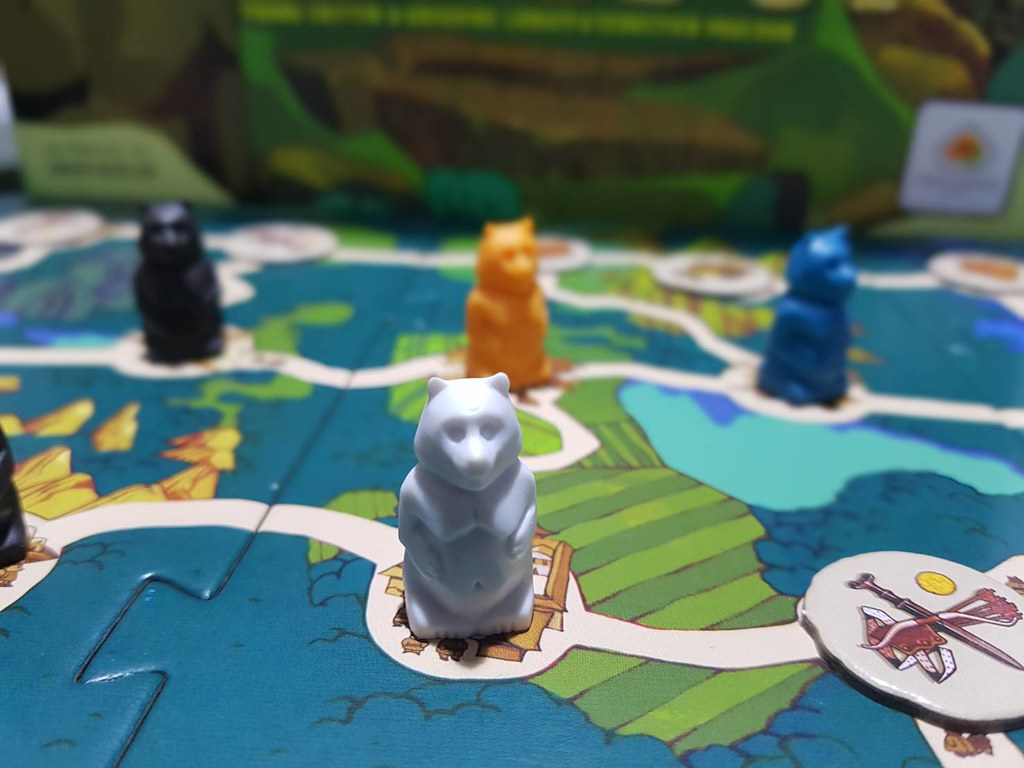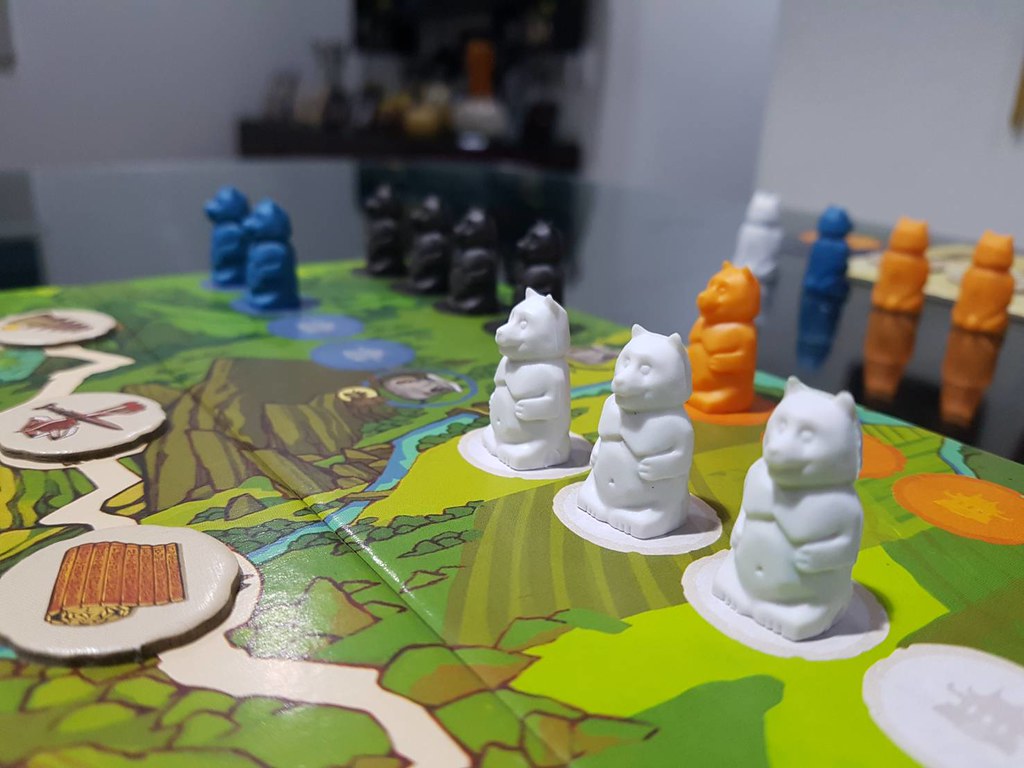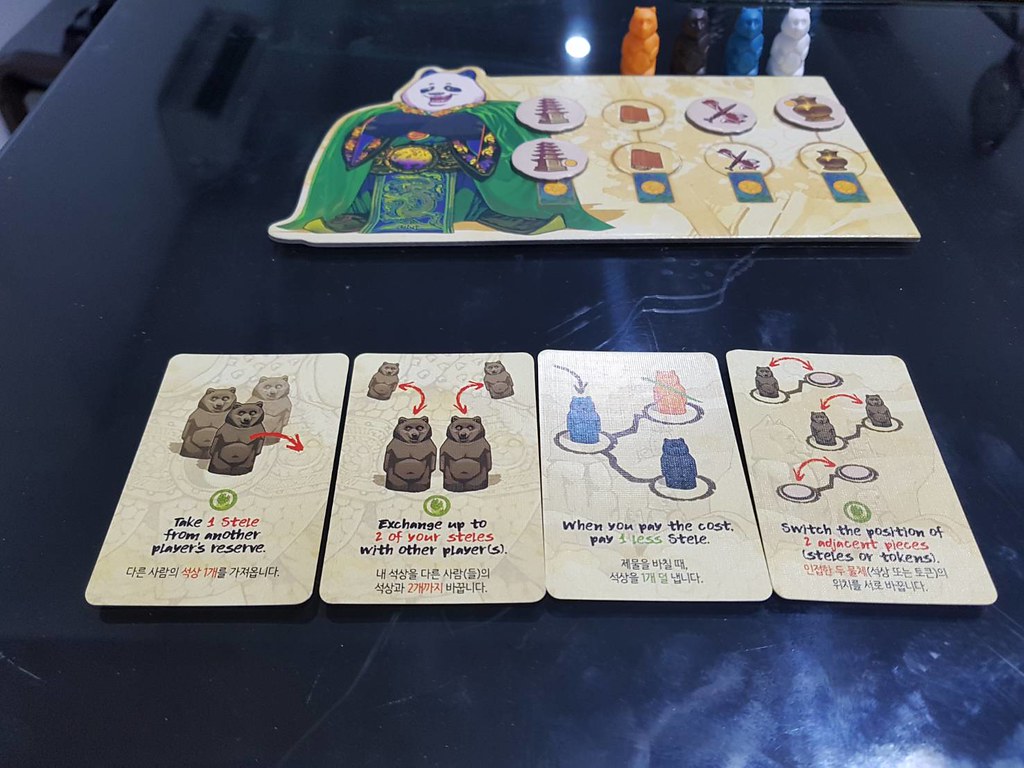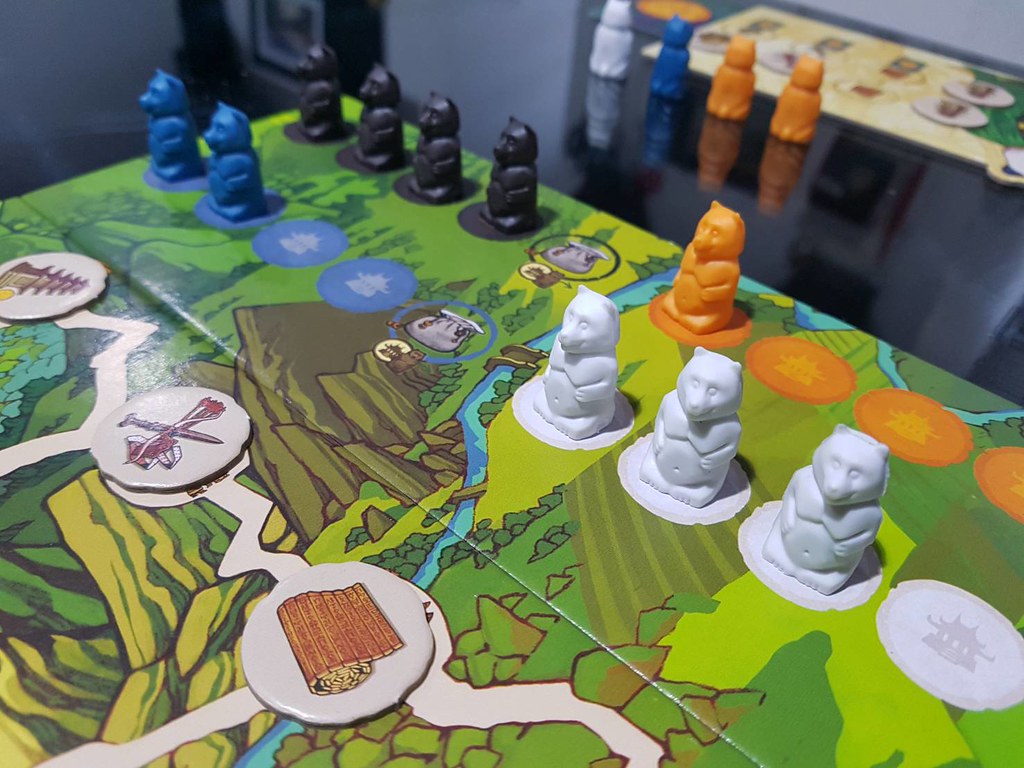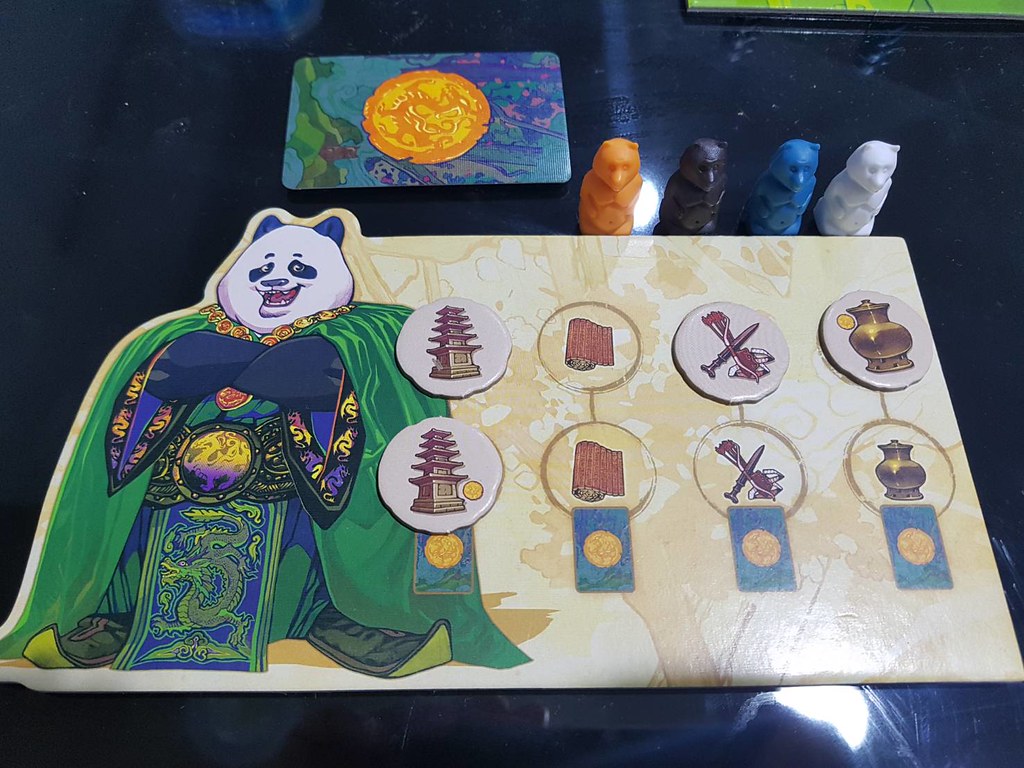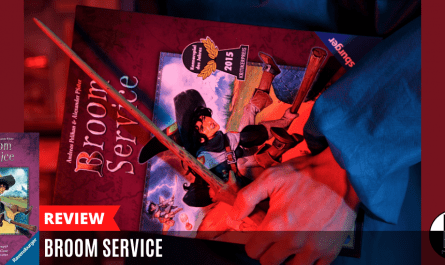After a very long pause due to the holiday season in 2018, we are back to provide you with Wangdo, another board game from Asia that we got from Spiel Essen 2018. Wangdo is designed by Frank Crittin, Grégoire Largey, and Sébastien Pauchon; it is published by Mandoo Games, a board game company based in South Korea. I met with Evan Song, the editor of Mandoo Games; he was really excited to introduce all the games they released during the event, especially this Wangdo.
A glimpse of Wangdo
Wangdo is a board game for 2-4 players; it approximately needs 35 minutes to complete one gaming session. In this game, each player will represent the prince of a bear clan racing to spread the influence all over the country and try to be the next reigning king. The bear princes will travel across the land to gain knowledge of religion, education, military, and commerce. While doing so, they build the sacred bear statues in order to gain the influence to pave the path to the throne.
One of the game designers has a PhD in mathematics and he was inspired to design a game with the other two to prove the 4-colour theorem, you can find the details about it here. The cute artwork was illustrated by Jakub Rebelka. I did not have the luxury of time to try it in the Spiel Essen with Evan, but he was so kind to explain the background of this game and of course, the ‘how to play’. Now, let’s begin our competition to be the new leader of the bear land.
How to play Wangdo
First, set up the map in the middle and distribute the knowledge tokens face down across the map based on the number of the players and then flip it face up. Then, place the bear Steles with random colour to the spot where the bear tokens appear and remove these tokens. Place one bear Stele on the first spot of each colour on the temple section. Then, distribute the player board and 3 bear Steles to each player.
The race to collect the knowledge tokens can begin. On his or her turn, the player decides whether to get new bear Steles or to acquire a knowledge token. To get the bear Steles, you can take 3 randomly from the bag or take any 2 Steles from the temple. Each player can only have 10 Steles in their possession.
You can only take the knowledge token that is adjacent to at least one bear Stele; in order to do so, you need to build a bear Stele on that spot and you cannot build a Stele adjacent to another one of the same colour. After that, the player should pay the offerings to the temple; this is decided by the colour of all the adjacent Steles.
A ritual is triggered when the temple of one colour is full; when it happens, mix the Steles of that colour into the bag and the player who triggers it may take a Stele from any other temple. The player can use this Stele to pay for the offering in which it is triggered, too!
Every time the player acquires the second knowledge token of the same type, then he or she takes the seal cards. These cards give players advantages that help to win the game. The end-game triggers when a player has collected all of the knowledge tokens; the game will continue until the end of that round so everyone gets the same number of turns. If he or she is the one who collects all the knowledge tokens, then he or she wins the game. If there is more than one player that collect all the knowledge tokens, then the dragon seals will be the tiebreaker. If it is still tied, they share the victory.
For footnote purpose, the dragon seals are indicated on some of the knowledge tokens, the unused seal cards, and some seal cards that give dragon seals.
The experience as the bear prince
I just got the chance to try this game with several friends of mine who were not really familiar with board games. The game is really easy to teach; they understand it hassle-free and the game can begin without any delay. The biggest hurdle is to convince them that this game is worth to try; some of them backed off because the age range starts at 8+ years old and the artwork really depicts that this game is meant for the younger audience, indeed.
The bear Steles act as the currency in this game because the bear prince pays to get the knowledge tokens. The core mechanic is set collection and in addition to that, we can feel the area control, too. The game offers a small bit of strategy and it mostly is dictated by luck because players take the Steles from the bag more often than from the temple; and also the seal cards are acquired randomly.
The ritual can also really help you to get a Stele that you want. This will be really helpful, especially if you can trigger it during the moment when you are paying the offering. I would say that timing is the essence to chain it.
It would be hard to get only 2 Steles per turn; only taking 2 Steles from the temple really gives you a disadvantage. That’s why I tend to take randomly from the bag hoping for a good pull. However, in the mid and late game, sometimes taking the Steles from the temple is necessary because the rule that prevents players to put the same colour in adjacent to the other Stele will really limit your movement.
My final thoughts on Wangdo
Although Wangdo is targeting the younger audiences, this game is actually pretty interesting for older players. It is simple and it does not need much time to set up. The artwork itself is really alluring and it will be a good addition to your shelf. The game is really suitable for parents to play with their kids; however, this game can be a good filler for veterans, too.
You will get random seal cards when you get two knowledge tokens of the same type. These cards can be really important during the late game, especially if it helps you to stall your opponent to get his or her last knowledge token. Only use it when you think it’s the right time.
One game with 3 players is challenging already; I would say, however, that playing with 4 players will be more fun! I did not like to play this with 2 players only because you don’t grasp the feeling of the race (and it has less conflicting situation). This game can be a good gateway game for kids to get to know board games; it will be really exciting for them, and the artwork really helps the job. Some older people might doubt that Wangdo is suitable for them because of this, though.
So, if you love something more complicated that needs proper planning of strategy and such, Wangdo is not for you. Wangdo is a very fast-paced game for those who like a simple game.
Thank you for Evan Song and his team, and thank you Mandoo Games for the chance to review your game! I also appreciate the help coming from Invaders Board Game Station‘s crews that really spared their busy time to try and playtest this game.
I am a full-time food technologist during weekdays. However, when the calendar hits weekends, I transform into an avid board gamer. I am a hardcore Legend of the Five Rings (L5R) LCG player from Fantasy Flight Games (FFG). Current hobby: buying board games. My shelf of shame’s list is getting longer, thanks to you, Kickstarter.


